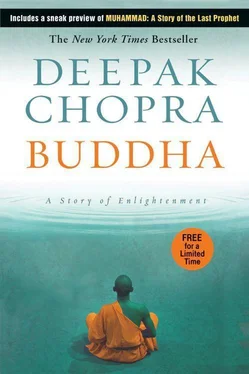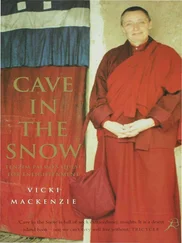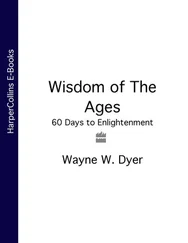Bolder now, he wanted to push further. More extreme austerities lay ahead. He could pile rocks on his chest or pierce his cheeks with sharpened sticks. There were legendary yogis who tore their own arms off and threw them into the fire. But the five monks resisted. They had been given no signs of their own. Gautama knew that he had to preach conviction into his brother monks. Otherwise, he would open his eyes one day after a cruel austerity and find that they had vanished.
“You doubt my methods, don’t you?” he said.
“Yes,” said the eldest monk, who was named Assaji. “If you could see yourself, you would be frightened. Why do you think that inviting death is the way to defeat it?”
“Because when everything else has failed,” said Gautama, “whatever is left must be the answer. I’ve done nothing yet to earn your respect, but believe me when I say that I have tried everything to become free. I learned the Dharma of the higher self, but I never met my higher self or heard a word from it. I learned the Dharma of the soul, which was supposed to be my speck of the divine, but no matter how blissful I might feel, the time always came when I was overwhelmed once more by anger and sorrow. Much the same must be your experience.”
The five monks said nothing, which Gautama took to be assent.
“In time I concluded that my struggles could last a lifetime, and to what end? I will still be a slave to karma and a prisoner in this world. What is this karma that visits us with so much suffering? Karma is the body’s endless desires. Karma is the memory of past pleasure we want to repeat and past pain we want to avoid. It’s the delusions of ego and the storm of fear and anger that besieges the mind. Therefore, I have resolved to cut karma out by the roots.”
“How? You think you know something that no one else knows?” Assaji asked. His rail-thin body already showed the effects of years of austerity.
“Myself, no. But you live the ascetic’s life. Haven’t you already spent years sitting in silence, repeating your prayers, contemplating images of the gods, reciting a thousand and eight names of Vishnu?” The eldest monk nodded. “Has any of it made you free?”
“No.”
“Then why should you continue to do more of what doesn’t work in the first place? The temple priests taught you how to reach God-priests who have not found freedom either, but who claim title to the holy teachings the way a farmer puts a brand on cattle.” Gautama had eaten nothing for days and barely slept. He wondered briefly if he sounded delirious.
One of the younger monks interrupted. “Tell us your way.”
“On the road I met an old sannyasi named Ganaka, and he told me something important. Let the world be your teacher. I couldn’t understand what he meant at first, but now I do. Every experience that traps me is a worldly experience. The world is seductive and hard to interpret for what it really is. Yet this world is nothing more than desire, and every desire makes me run after it. Why? Because I believe it’s real. Desires are phantoms, concealing the grinning face of death. Be wise. Believe in nothing.”
It took many nights around the fire, but Gautama and the five monks came to an agreement. They would give their bodies nothing to live for in the world, no desires to fulfill, no cravings to become a slave to. They would sit like statues facing a wall, and no matter how many desires arose, each one would be coldly turned away. “Even if we are tied to our karma by ten thousand threads,” said Gautama, “we can break them one at a time. When the last attachment is gone, karma will be dead instead of us.”
He believed every word. Perhaps the five monks didn’t, but they followed him. They sat like statues facing a wall and waited. Gautama was so fervent that he expected to reach his goal soon. Assaji wouldn’t commit himself. “Unhappiness is born of expectations that don’t come true,” he reminded his brother monk. “Even to expect nothing can be a trap.”
Gautama bowed his head. “I understand.” But this gesture of humility disguised the fire he felt inside. In legend, other yogis had found immortality. They were great aspirants, and Gautama saw himself as nothing less. He chose a spot away from all shelter, sat down on a patch of rocks without clearing them away, and waited.
“IF YOU MUST GO, then go. I don’t need a reason,” said Assaji. He looked on Kondana with mild eyes that held no reproof. Kondana was the youngest of the five monks, but he had proved the toughest in the end.
“You already know my reasons. Look at him,” Kondana protested. He pointed at a gnarled carving lying on the jungle floor, which was so close to looking like weathered wood that at times he had to remind himself that it was actually a living person-Gautama.
“I can’t stay and watch him kill himself,” said Kondana. “It’s like watching a corpse decay while it’s still breathing.” He had already stayed longer than three of the five monks. None were impatient. Since vowing to follow Gautama, they had pursued enlightenment for five years.
“He never moves anymore. I wonder where he is,” said Assaji.
“I think he’s in hell,” Kondana said mournfully.
The years of austerity had caused many things to happen. They had all gone through experiences in meditation that they never dreamed possible. Assaji himself had visited the home of the gods. He had watched Shakti, the sinuous consort of Shiva, dance for him, a dance where every step shook the worlds and the tinkle of ankle bells turned into stars. He had conversed with the greatest sages, like Vasishtha, who had been dead for centuries. Only Gautama never told such tales, and after winter settled in among the Himalayan peaks, it was a matter of survival to force him to find a place where they could be more protected. Reluctantly Gautama agreed, but only on the condition that he would continue his austerities and that the five monks would make no contact with other human beings.
An emaciated man whose skin has toughened into cracked brown hide and who has subsisted on a tenth of the food given to a newborn baby is not a sight for ordinary eyes. Some people would consider him a fraud, others a madman. The superstitious few would call him a saint. “I do not know who I am anymore,” Gautama said. “But I am blessed, because it has taken me only five years to know who I am not.”
Now Assaji walked over to Gautama and with Kondana’s help set him upright again. He had fallen over during the night, and these days he was lost in a samadhi so deep that nothing registered from the outside world. It was up to the other monks to feed him by opening his mouth and placing a handful of chewed rice in it. They carried him to the river to bathe him and moved him out of the worst of the searing sun. All this made it appear that Gautama was helpless and paralyzed. But Assaji knew that appearances were deceiving. Gautama was on a quest the likes of which went back almost before time.
Kondana put on his sandals and tucked some dried berries into the corner of his shawl. “Will you come?” he asked Assaji.
“No.”
“You still think he has a chance-he might succeed?”
“I wouldn’t say that.”
There was nothing more to talk about. Kondana bowed down before Gautama and placed a pink wild orchid at his feet in reverence. He no longer felt guilty over losing hope; he was too exhausted to feel much of anything. As he left camp, Assaji touched him on the shoulder.
“When the time comes I’ll send for you. The five of us should carry the body back to his people.”
That was the last word Assaji said or heard for the next three months. Spring came, and every day brought a shower of creamy white blossoms falling from the sal trees that blanketed the northern forest. Gautama had not altered. At times he showed more signs of life than at other times. Assaji would hear him at night walking out of camp for the call of nature, but that was rarely. The water level might dip in the gourd Assaji placed by his side.
Читать дальше












